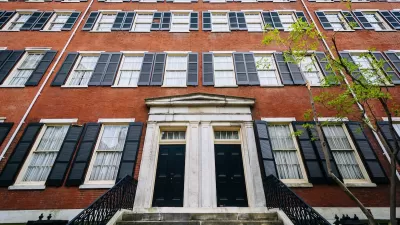Germantown has acquired many more wealthy residents without displacing many of its long-term residents or losing its diversity.

Philadelphia is the fourth most segregated city in the United States according to a study from Brown University, but Germantown is an exception. "Philadelphia overall is one of the country’s more diverse large cities: African-Americans make up 43 percent of the population; Caucasians account for 41 percent; and Asians and those who identify as other races make up about 6 percent each," Sandy Smith writes for Next City. Smith argues that Germantown in is a bit of a hidden treasure, unfamiliar to those outside of northwest Philadelphia, a neighborhood that's 80% African American with a wealth of homegrown resources and “third places,” whether barber shops or coffee houses.
Germantown is home to residents of a variety of different income levels and it has welcomed a mix of different people for centuries. "William Penn was a Quaker who left England to establish an American colony that would be tolerant to all religious beliefs. In 1683, Penn sold land in his new colony to Francis Daniel Pastorius so that the German religious dissident could establish a settlement where his fellow Pietists, as well as Mennonites and Quakers, could practice their beliefs freely," Smith reports.
Today, Smith argues, local developers and a slow pace of change has meant that, even as Germantown has become home to some wealthier residents, it has been able to maintain its character and not push out those who lived there already.
FULL STORY: How This Philadelphia Neighborhood Is Gentrifying without Displacement

Planetizen Federal Action Tracker
A weekly monitor of how Trump’s orders and actions are impacting planners and planning in America.

Chicago’s Ghost Rails
Just beneath the surface of the modern city lie the remnants of its expansive early 20th-century streetcar system.

San Antonio and Austin are Fusing Into one Massive Megaregion
The region spanning the two central Texas cities is growing fast, posing challenges for local infrastructure and water supplies.

Since Zion's Shuttles Went Electric “The Smog is Gone”
Visitors to Zion National Park can enjoy the canyon via the nation’s first fully electric park shuttle system.

Trump Distributing DOT Safety Funds at 1/10 Rate of Biden
Funds for Safe Streets and other transportation safety and equity programs are being held up by administrative reviews and conflicts with the Trump administration’s priorities.

German Cities Subsidize Taxis for Women Amid Wave of Violence
Free or low-cost taxi rides can help women navigate cities more safely, but critics say the programs don't address the root causes of violence against women.
Urban Design for Planners 1: Software Tools
This six-course series explores essential urban design concepts using open source software and equips planners with the tools they need to participate fully in the urban design process.
Planning for Universal Design
Learn the tools for implementing Universal Design in planning regulations.
planning NEXT
Appalachian Highlands Housing Partners
Mpact (founded as Rail~Volution)
City of Camden Redevelopment Agency
City of Astoria
City of Portland
City of Laramie





























